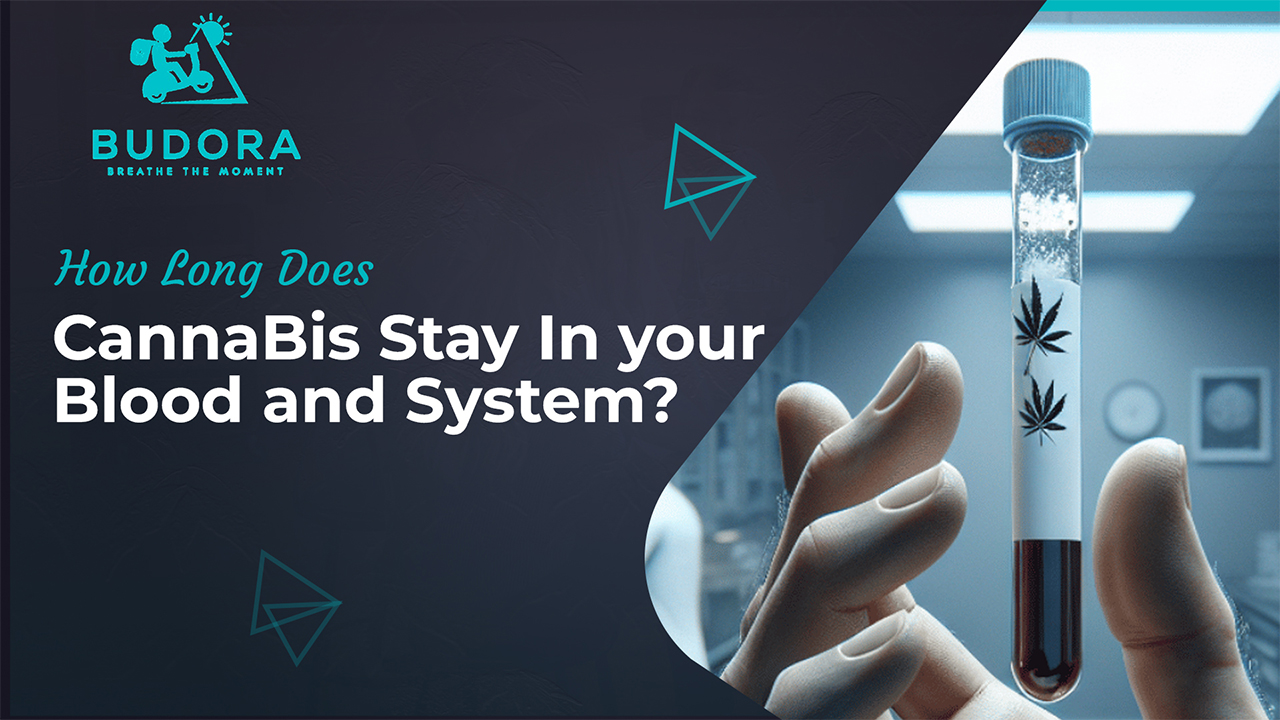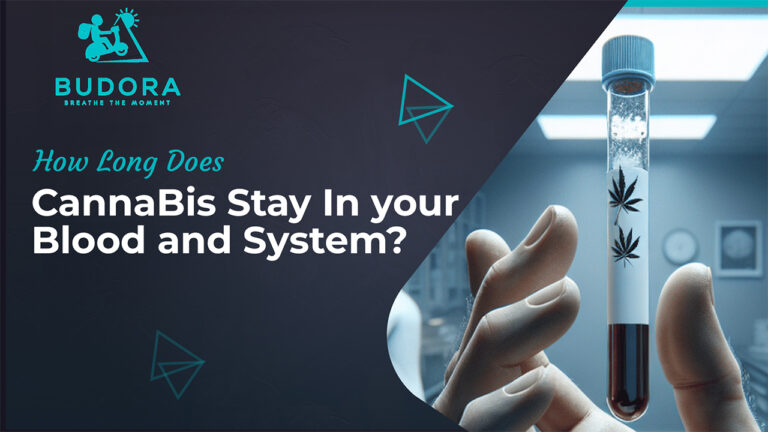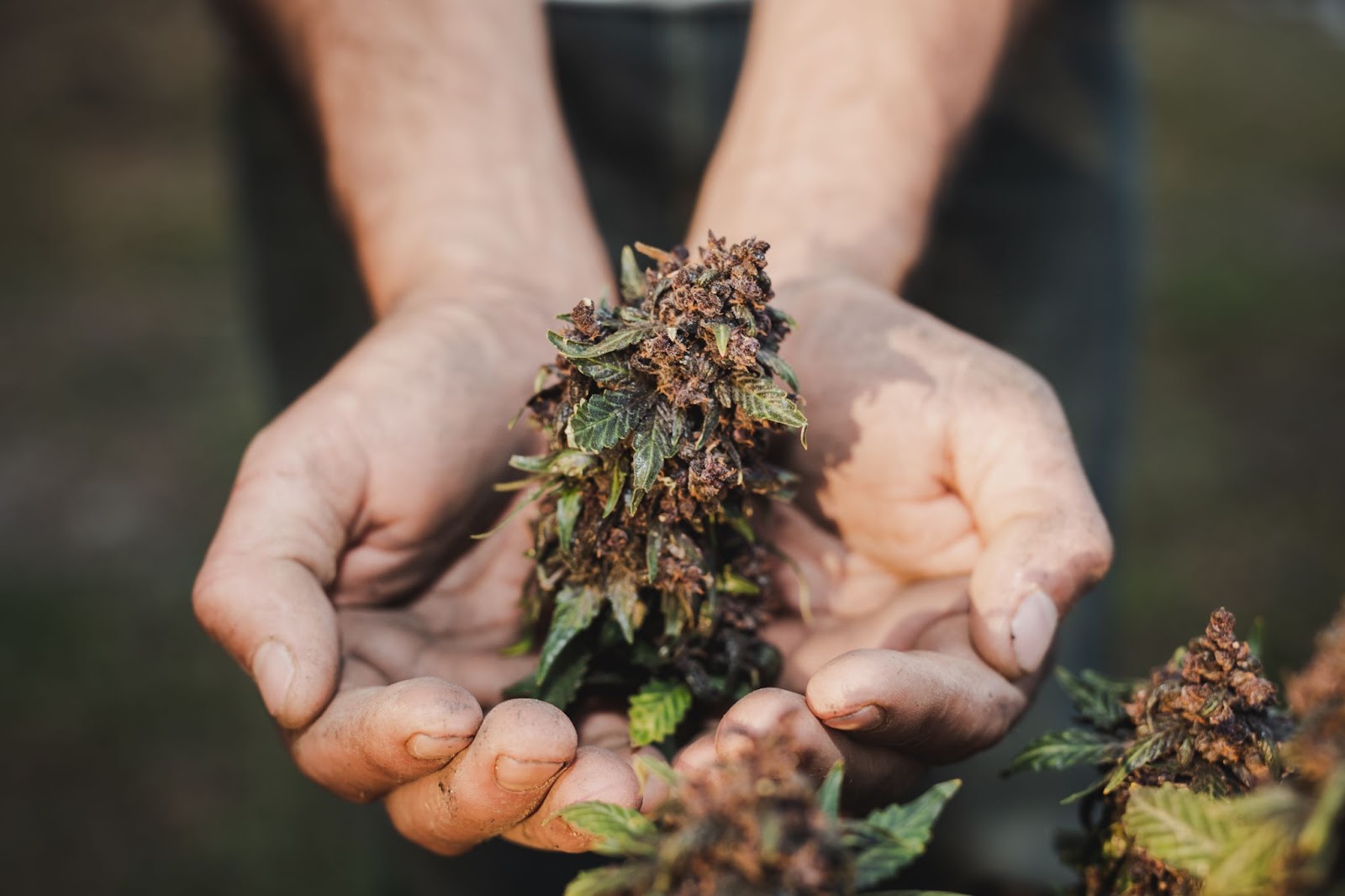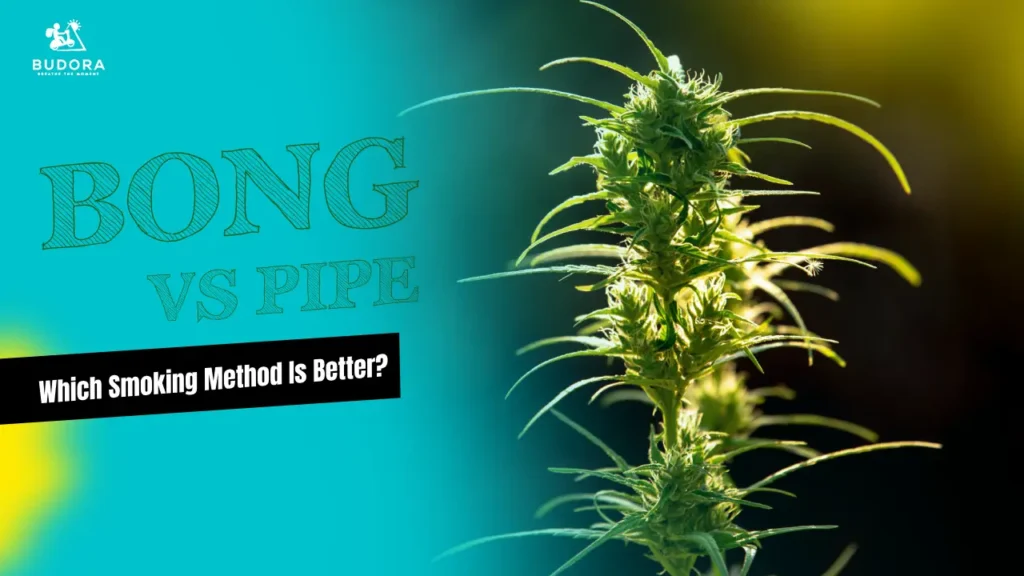How Long Does Cannabis Stay in Your Blood and System?
- Budora
- Cannabis WeedBlogs


Cannabis usage is becoming increasingly common, but its presence in the bloodstream is still a concern for those facing medical tests, job screenings, or legal evaluations. If you’re wondering how long cannabis stays in your blood, this guide covers everything you need to know—from THC metabolism to blood detection timelines and tips to reduce retention time.
Key Takeaways
- THC can remain in the bloodstream for 1 to 10+ days, depending on usage frequency, body fat, and metabolism.
- Blood tests detect active THC and are often used in legal, medical, and workplace screenings.
- Staying hydrated, exercising, and avoiding further use can help reduce THC detection time.
How Cannabis Works in the Body
When you inhale or consume cannabis, THC (tetrahydrocannabinol) quickly enters the bloodstream and travels to the brain, producing psychoactive effects. It is then broken down in the liver into metabolites like THC-COOH, which can stay in your system long after the effects wear off.
These cannabis metabolites in blood are stored in fat cells and released slowly over time, influencing how long THC stays in your system. For a smoother consumption experience, explore our premium cannabis vapes available for quick delivery.

How Long Does THC Stay in Your Blood?
On average, THC is detectable in blood for 1 to 3 days after occasional use. For heavy users, detection may extend to 7–10+ days. Blood tests measure the active THC and are commonly used in accident or roadside testing situations.
THC blood test detection time can vary depending on how often and how much cannabis you consume.

Cannabis Detection Time Chart by User Type
| Cannabis Compound | First-Time User | Occasional (2–4x/month) | Regular (weekly) | Heavy (daily) |
|---|---|---|---|---|
| THC | 1-2 days | 2-3 days | 5-7 days | 10+ days |
| THCA | 1-2 days | 2-3 days | 5-7 days | 10+ days |
| CBD | 1-2 days | 2-3 days | 5-7 days | 10+ days |
| Other Cannabinoids | 1-3 days | 3-5 days | 7-10 days | 10-14 days |
Factors That Influence THC in the Bloodstream
Understanding these key factors helps predict how long cannabis stays in your system:
🔹 Body Fat
THC binds to fat cells. The more body fat you have, the longer it may take to eliminate THC.
🔹 Frequency & Dosage
Daily users may take significantly longer to detox than occasional users.
🔹 Metabolism
People with faster metabolisms typically clear THC faster from their bloodstream.
🔹 Hydration & Diet
Staying hydrated and eating fiber-rich foods may aid detox but won’t drastically shorten detection time.
🔹 Exercise
Physical activity may mobilize fat stores and release THC, but could temporarily raise blood THC levels.
If you’re concerned about cannabis detection or want more budget-friendly consumption options, check out Budget Buds – ideal for regular users who want quality without overspending.
How Long Does THCA Stay in the Blood?
THCA is a raw, non-psychoactive cannabinoid that converts to THC when heated (e.g., smoking or vaping). While less studied, THCA can linger in the system similarly to THC, especially in regular users.
Tips to Reduce Cannabis Detection Time
While there’s no magic trick to detox instantly, these tips may support a faster THC clearance:
Exercise Regularly
Burns fat cells where THC is stored. Regular cardio and strength training help speed up your metabolism, making it easier to break down stored THC. Sweating through exercise can also aid in releasing toxins from your body.
Stay Hydrated
Helps the body flush metabolites naturally. Drinking water consistently keeps your kidneys active and supports faster toxin elimination. While hydration won’t erase THC, it prevents buildup and aids overall cleansing.
Eat Clean
High-fiber diets support digestion and toxin removal. Whole foods like fruits, vegetables, and grains help move toxins out through the digestive tract. Avoiding processed and greasy foods gives your body a better chance to detox efficiently. See the complete guidelines, what to eat before and after cannabis use.
Avoid Further Use
Give your body time to reset. Continued cannabis use only adds more THC to your system, extending detection time. Pausing consumption allows your body to focus on clearing existing metabolites.
Be Wary of Detox Kits
Some may work for urine, but few are effective for blood tests. Many products make big claims but don’t deliver reliable results, wasting money and time. Natural detoxing and exploring low-THC flower strains are safer long-term solutions.
Risks of THC Detection in Blood Tests
Workplace Testing
Especially common in safety-sensitive industries. A positive THC test could lead to suspension, termination, or loss of future job opportunities. Even if cannabis is legal in your region, many employers still enforce strict drug-free policies.
Medical Procedures
Doctors may screen for THC before surgeries or prescriptions. THC in the bloodstream can interact with anesthesia or prescribed medications, affecting safety and treatment outcomes. Being transparent with your healthcare provider ensures better care and avoids complications. See how long THC edibles stay in our blood.
Legal Situations
THC detection can impact DUI cases or custody battles. Even if you are not impaired at the time, THC metabolites may remain detectable and influence legal decisions. Understanding how long cannabis stays in your system is crucial for avoiding unintended legal consequences.
Final Thoughts
Understanding how long cannabis stays in your blood can help you make informed choices about consumption and its potential impact on your job, health, or legal standing. THC detection depends on many personal factors, like body fat, metabolism, and usage patterns.
When in doubt, it’s best to avoid use before important screenings and allow time for your body to detox naturally.
FAQs About Cannabis in the Bloodstream
Can cannabis be detected in the blood after two weeks?
In rare cases—especially with heavy, daily use—THC might still be detectable after 10–14 days.Will secondhand smoke cause a positive blood test?
Unlikely, unless you’re in an unventilated room with excessive smoke exposure.What’s the difference between a THC blood test and a urine test?
Blood tests detect active THC for a shorter period; urine tests detect THC metabolites for much longer (up to 30 days).Are there any detox drinks that work for blood tests?
Most detox products target urine. For blood tests, hydration and abstinence are your best options.Is CBD also detected in blood tests?
Yes, but most standard tests are focused on THC, not CBD—unless specified.Like this article?
Budora
OTHER ARTICLES YOU MAY LIKE




